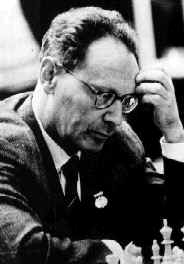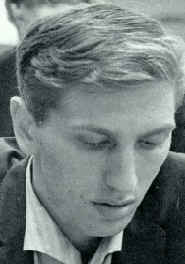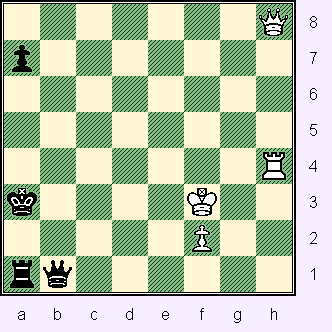All
the |
(Navigation bar
directly below.)
*******
© A.J. Goldsby, 2015.
(All rights reserved.)
****************
Click HERE
to see my
Chess Items.
****************
****************
Buy a book
from Amazon.com
(And help me out as well!)
****************
Click HERE
...
to see a list of the businesses that help to sponsor all of
my chess efforts.
|
James O'Fee - of Impala Publications - writes:
<< "Before computers, Grandmasters would rack their brains to analyse positions correctly. In their first meeting at the Varna Olympiad in 1962, Bobby Fischer drew with World Champion, Mikhail Botvinnik. In his book ‘My 60 Memorable Games’ [London, 1969], Fischer claimed that he was winning at one point and threw away the win. Botvinnik claimed that he always had the draw in hand and passed the problem over to a young student, Garry Kasparov, to prove the matter."
"Later
in life, the same Garry Kasparov once challenged his rival, Anatoly Karpov,
to an ‘analysis match’. Kasparov wanted to prove that, not only was he
better than Karpov over the board, but that he was better at analysis, too."
"Today, Keene reports, all grandmasters do to find the ‘chessic
truth’ of a position is feed it into Fritz
(a successful computer program). Nor is Fritz, David Levy claims,
the best computer program around. He thinks it might only achieve 6-8th in the
World Chess Computer Championship, were it to compete."
>>
-
Editor James O'Fee, Blog
entry
for Tuesday, June 06, 2006.
(The London Times 'games' page,
you can find GM Keene's column
listed there.)
The mighty clash, Botvinnik vs. Fischer.
|
|
|
The PGN score for this contest
[Event "Varna ol (Men) fin-A"]
[Site "Varna"]
[Date "1962.09.16"]
[Round "10"]
[White "Botvinnik, Mikhail"]
[Black "Fischer, Robert James"]
[Result "1/2-1/2"]
[ECO "D98"]
[PlyCount "135"]
1. c4 g6 2. d4 Nf6 3. Nc3 d5 4. Nf3 Bg7 5. Qb3 dxc4 6. Qxc4 O-O 7. e4 Bg4 8. Be3 Nfd7
9. Be2 Nc6 10. Rd1 Nb6;
11. Qc5 Qd6 12. h3 Bxf3 13. gxf3 Rfd8 14. d5
Ne5 15. Nb5 Qf6
16. f4 Ned7 17. e5 Qxf4 18. Bxf4 Nxc5 19. Nxc7 Rac8;
20. d6 exd6 21. exd6 Bxb2 22. O-O Nbd7 23. Rd5 b6 24. Bf3 Ne6 25. Nxe6 fxe6 26. Rd3 Nc5 27.
Re3 e5 28. Bxe5 Bxe5;
29. Rxe5 Rxd6
30. Re7 Rd7 31. Rxd7 Nxd7
32. Bg4 Rc7 33. Re1 Kf7 34. Kg2 Nc5 35. Re3 Re7 36. Rf3+ Kg7
37. Rc3 Re4;
38. Bd1 Rd4 39. Bc2
Kf6 40. Kf3 Kg5 41. Kg3 Ne4+
42. Bxe4 Rxe4 43. Ra3 Re7
44. Rf3 Rc7 45. a4 Rc5 46. Rf7 Ra5;
47. Rxh7 Rxa4 48. h4+ Kf5 49. Rf7+ Ke5 50. Rg7 Ra1
51. Kf3 b5
52.
h5 Ra3+ 53. Kg2 gxh5 54. Rg5+ Kd6 55. Rxb5 h4;
56. f4 Kc6
57. Rb8 h3+
58. Kh2 a5 59. f5 Kc7 60. Rb5 Kd6 61. f6 Ke6 62. Rb6+ Kf7
63. Ra6 Kg6 64. Rc6 a4
65. Ra6
Kf7;
66. Rc6 Rd3 67. Ra6 a3 68. Kg1, Draw agreed.
1/2 - 1/2
[ replay, (on another site) Many good comments there as well. ]
The particulars of this game.
First
off, let me state that I have no interest in analyzing this game, at least not
right now.
(Often - my DEEP analysis of a game - can take months, or even
years. Click here to see one such example.)
There are many good sources for this, allow me to recommend just three. (BTW, I have all 3.)
-
<< My 60 Memorable Games, >> By GM Robert J. Fischer.
Copyright by the author, first printed in 1969 / Faber & Faber Limited / London, Great Britain.
{Fischer "only" devotes thirteen pages of analysis to this magnificent battle royale!} -
<< Bobby Fischer, rediscovered. >> By GM Andrew Soltis.
Copyright by the author, A. Soltis. Published in 2003 by Batsford chess books. -
The ChessBase monograph ... (on CD-ROM) ...
<< World Champion Fischer,>> by GM Robert Huebner.
The analysis of these three authors leaves almost no stone unturned.
GM Larry Evans writes:
< Game # 39, "The confrontation" >
<< This dramatic meeting between the generations took place on board 1 after it was rumored that Botvinnik would be given a "rest day" against the American team. But it was fated that Fischer, at last, albeit with Black, would have a crack at the world champion. >>
<< Walking into a prepared variation, Fischer promptly refutes it. "The reader can guess that my equanimity was wrecked," confesses Botvinnik, whose notes are incorporated here. Nervously, he proceeds to run his still tenable position downhill. But Fischer, instead of nursing his winning advantage, simplifies too quickly, and reaches an adjournment where victory is problematical. After a sleepless night of analysis, Botvinnik finds a stunning defense. Fischer engages in a seemingly harmless transposition of moves (51...P-QN4), and falls into a pit -- throwing away the win he maintains was still there. >>
-
GM Larry Evans ... in his introductory notes to this game - in Fischer's classic
book, see #1 above.
(Game # 39, page # 240 of the paperback edition.)
|
|
My thoughts on this classic chessical encounter:
Fischer was clearly prepared for his opponent's opening. Bobby should have been out-gunned, after all, he was just one man, and the Soviet chess players usually worked as a team. However Fischer refuted Botvinnik's opening on the spot. (Fischer's opening play can only be described as magnificent.)
But I think there were a lot of nerves {pride} at stake here; Fischer was (too) eager to prove himself, and Botvinnik was anxious not to lose his first chess encounter with the former prodigy and well-known talent - that was Bobby Fischer in his younger days. (Circa the early 1960's, when this contest was actually played.)
I have no doubt - that were I to subject this game and its analysis to a deep and thorough investigation - I would probably discover many new or hidden points. [And this is not a boast, just an observation. Much of this material is nearly fifty years old, the giant strides that computers have made in the last 5-10 years almost guarantees that new discoveries would be made. (And this is the point of O'Fee's post ... and that is why I quoted him here.)]
Soon much of this ending will be subjected to the kind of analysis ... where every single possible position is completely mapped out. (Many of the endings, from just three pieces, all the way to seven or more pieces ... have been so accounted for - a little something called "The Nalimov Endgame Tablebases.") At that point in time, it will be ascertained for a fact whether or not Fischer ever had a win, and what was missed (or not missed) in this extremely complex ending. And until then, much of the hollering and yelling ... is just that. (A lot of hot air!)
Most people may not know that Fischer and Botvinnik thought {seriously} about playing a WCS match. At one time, Fischer claimed to have the backing for such a match, but it was doubtful that the Soviet machinery of communist-controlled sports' organizations would have ever allowed such an event to take place. (Botvinnik would have had too much to lose.) Its a pity too - the world might have seen some really interesting games.
I also do not think Fischer was ever really objective about this game ... and his analysis strongly reflects this. Take for example Botvinnik's 25th move, NxN/e6. Fischer strongly damns this play and assigns a whole question mark to it. ("?") For close to 10 years, this exchange was the first choice of strong computer programs, and even today, it does not cause a significant change in the way that computers "score" this position. (Which is reflected by their numerical evaluation of any position.) I tend to lean towards 25.Bg3 as being the best move for White, while Dr./GM R. Huebner (and Botvinnik himself!) endorsed Bh2. (Fischer liked 25.Be3, and gave this as best in his notes to the game.) And while it is possible that Botvinnik's move was not the most accurate -- at worst it only a minor lapse, and not the major gaffe that Fischer made it out to be. (And this is backed up by the fact that Soltis - and several other authors - have given this play no mark at all in their annotations to this struggle.)
I have studied this game since before my teenage years, in my opinion, there is much analytical territory that has yet to be thoroughly mapped out. For example, on move forty, Fischer played 40...Kg5; and most commentators give this move without any comment at all. Yet when I was 14 or 15, I was convinced that this was the wrong move, the Black King is stuck there for some time ... and is subsequently (somewhat) out of play. (I wanted to play either 40...P-KR4 or 40...PKN4.) And it is gratifying for me to learn that Fritz 9 ... after several hours of {machine} analysis ... is agreeing with me on this point.
-
There are many moves in this game that I have wondered about, one day the computer may be able to provide their carbon counterparts with the definitive silicon answers to all of our questions!
Of course, not all the analysis of this game is bad, some hits the nail right on the head. For example, when I was a young lad, one of the things that I loved to do was anchor a Knight to a pawn. I thought it was a magical position when I could achieve this ... especially when the Knight and the anchor Pawn were on the opposite-color square of my opponent's Bishop. This set-up seemed impervious and I thought I could not lose when I gained such an ideal fortress. That is why I was mystified when Fischer played 41...Ne4+?; voluntarily surrendering his "magic" Knight for a ho-hum Bishop. (And even the chess programs see a rather sizable turnaround in their evaluations after this errant play by Fischer.) One can only imagine that Fischer was so overcome with an attack of nerves, that his desire to reach a 'won' ending overpowered his normally machine-like judgment.
*******
And probably the most crucial part of the analysis came in the R+P ending. In one position, Fischer claimed a clear win, but our entire chess club - when I was still a teenager - was unable to divine the solution ... despite repeated attempts and many hours of throwing the pieces about. (See the section below.)
GM Mikhail Botvinnik (2774) - GM Robert J. Fischer (2738);
[D98]
The (FIDE) {men's}
Olympiad
Varna, Bulgaria; (Round #10)
/ 1962.
[A.J.G.]
******************************************************************************************
This
is from the diagram ... at the top of page # 252.
{From, "My 60 Memorable Games," by the one and only Bobby Fischer.}
The key position of Fischer's Analysis.
|
|
7Q/p7/8/8/7R/k4K2/5P2/rq6 b
(White's last move was 64.P-R8, {= Q}; (64.h8=Q); so it is Black to move in the position given above.
Fischer notes that both parties - each, working independently of the other - reached this key position in their analysis of this historic chess meeting!
*****************************************************************************
(Now Bobby's
main line is, and the following is a direct quote:)
"Correct is
64...Qb3+!; 65.Ke2 Qd1+; 66.Ke3 Rb1!!;
67.Qf8+ Ka2; "- / +"
and the White King will be without shelter from the coming avalanche of checks."
- GM Robert J. Fischer.
Of course, this is all nonsense, I have analyzed this position dozens of times over the years. Fritz 9 ... after several sessions of analysis ... was never able to find anything more than a simple perpetual check. {A draw that comes about after a series of checks can be repeated almost indefinitely.} (It is also possible that some of Fischer's moves - in this particular line - were not the best.)
The key move (now) will be 68.Qc5!!, ("=") and Black is unable to make any real progress.
[ B.C., (before computers); a 13-year old schoolboy ... by the name of Garry Kasparov discovered this move, and Fritz confirms that this is the correct try for White. After Qc5, White's game holds together quite nicely - there is no win. (And Kasparov was not the first to have discovered 68.Qc5. And Garry even found a second, unique way to draw that begins with 67.Rc4! See the book, <Russians versus Fischer> game # 55, and page # 117 for more details.) ]
½ - ½
This is a truly legendary game of chess, by two of the best players to ever play the game. (I believe that this was the only time these two chess giants ever met over the board.) Perhaps it is fitting that the game ended in a draw ...
And as great as this chess game is, this is also one of those rare contests where the stories that surround the struggle are as good as (or better) than the game itself!
-
A nice article, (with lots of links); on Bobby Fischer. (One on Botvinnik.)
-
An online encyclopedia - a useful link to have to look up relevant chess matters.
Click HERE to go (return) to my home page. (My main {GC} chess site.)
Click HERE to go (return) to my site map.
Click HERE to go to my domain.
Click HERE to go (return) to the blog pages of Impala Publishing.
Click HERE to see first mention of this article on the Impala site.
Click HERE to go to the next "blog-back" article. (On Alekhine's faked games.)
(Or just use the "back button" on your web browser.)
*******
This page was created in June 2006, and was posted on June 12th, 2006.
It was last edited on: Sunday, January 06, 2013 , 03:21 AM .
Copyright (©) LM A.J. Goldsby, 2013.
Copyright (c) A.J. Goldsby, 2013. All rights reserved.


